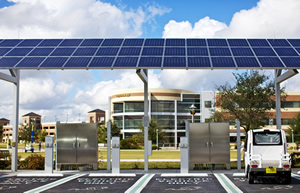Project 20:
Techno-Economic Analyses of Large-Scale Electric Vehicle Systems
Objective
Develop a computer model to evaluate the techno-economic implications of a large-scale electrified transportation sector. The model factors include developing and interacting with a network of electric vehicles and the electric grid, the infrastructure for electric vehicle charging, integrating the transportation and power systems into the urban setting, studying the impact of distributed energy storage and determining the economic impact of increased renewable energy and EVs on the electricity grid.

Figure 1. Electric vehicle charger on UCF campus with PV
power assist.
Photo: Enrico Sacchetti
Brief Description
This project will develop a computer model to evaluate the techno economic implications of a large-scale electrified transportation sector. The model factors include developing and interacting with a network of electric vehicles and the electric grid, the infrastructure for electric vehicle charging, integrating the transportation and power systems into the urban setting, studying the impact of distributed energy storage and determining the economic impact of increased renewable energy and EVs on the electricity grid.
Research Results
The current research focuses upon several innovative aspects of grid to vehicle (G2V) charging and vehicle to grid (V2G) feeding development, including such advances as plug-and-play operation, load/generation estimation through integrating renewable energy, distributed protection algorithm, and improving electric grid efficiency and delivery capacity by enabling reactive power compensation and voltage control (which does not affect battery life).
As an example, energy storage and reactive power supplied by electric vehicles (EV) through vehicle-to-grid (V2G) operation can be coordinated to provide voltage support, thus reducing the need of grid reinforcement and active power curtailment and in turn improving EV charging capacity of the overall system. Hence, an optimization and control framework is needed to manage energy storage availability in near future while using the remaining capacity of V2G to generate reactive power and cooperatively perform voltage control.
This project has a very broad scope. As a result of year 1 and 2 research efforts, several peer-reviewed papers have been published or accepted for publication or submitted for publication. The subsequent efforts will be made to conduct research in the following areas in consultation with external partners: 1) develop a scalable model of large-scale EV and power grid systems, 2) investigate interactions between large-scale EVs and their power grid systems, 3) work on developing and optimizing both G2V charging and V2G feeding algorithms, and 4) working on optimizing both transportation network and electric power grid.
During the past year, the resilience analysis of power grid with a high level of renewable and EV penetration is investigated. To this end, a resiliency index is proposed to capture the total loads which cannot be supplied under line removal due to extreme weather conditions. Using this index, a restoration method based on line switching is proposed to minimize the total load shedding and to guarantee the power delivery to critical loads due to line outages due to line outages.
The 5-year project activities are:
- Year 1: Identify an external partner and start the development of a scalable model of large-scale EV and power grid systems. A community partner, StarMetro of Tallahassee, was obtained, but they may be too small for this project. Hence, it was decided that an effort will be made to secure another partner in the future. (Status: completed)
- Year 2: Develop a scalable model of large-scale EV and power grid systems, in consultation with utility and other external partners. (Status: completed)
- Year 3: Work on developing and optimizing both G2V charging and V2G feeding algorithms.
- Year 4 and 5: Working on optimizing both transportation network and electric power grid.
Impacts/Benefits
Due to the three-year efforts, the following refereed journal/conference papers have been published or accepted for publication.
Journal articles:
- Zhihua Qu and Marwan A. Simaan, "Modularized Design for Cooperative Control and Plug-And-Play Operation of Networked Heterogeneous Systems," Automatica, vol.50, no.9, pp.2405-2414, September 2014.
- Ali Maknouninejad, Zhihua Qu, Frank Lewis, and Ali Davoudi (2014). "Optimal, Nonlinear, and Distributed Designs of Droop Controls for DC Microgrid," IEEE Transactions on Smart Grid, vol.5, no.5, pp.2508-2516, September 2014.
- Huanhai Xin, Yun Liu, Zhihua Qu, and Deqiang Gan, " Distributed Control and Generation Estimation Method for Integrating High-Density Photovoltaic Generations," IEEE Transactions on Energy Conversion, vol.29, no.4, pp.988-996, December 2014.
- Mohamed Al Hosani, Zhihua Qu, and Hatem Zeineldin, "Development of Current Dynamic Estimator for Islanding Detection of Inverter Based Distributed Generation,"IEEE Transactions on Power Delivery, vol.30, no.1, pp.428-438, February 2015.
- Mohamed Al Hosani, Zhihua Qu, and Hatem Zeineldin, "A Transient Stiffness Measure for Islanding Detection of Multi-DG Systems," IEEE Transactions on Power Delivery, vol.30, no.2, pp.986-995, April 2015.
- Mohamed Al Hosani, Zhihua Qu, and Hatem Zeineldin, (2015)"Scheduled Perturbation to Reduce Non-Detection Zone for Low Gain Sandia Frequency Shift Method," IEEE Transactions on Smart Grid, Vol 6, Issue 6.
- Yun Liu, Huanhai Xin, Zhihua Qu, and Deqiang Gan,“An Attack-Resilient Cooperative Control Strategy of Multiple Distributed Generators in Distribution Networks," IEEE Transactions on Smart Grid, 2016.
Conference papers:
- Azwirman Gusrialdi, Zhihua Qu, and Marwan A. Simaan, "Robust Design of Cooperative Systems Against Attacks," 2014 American Control Conference, pp.1462-1468, Portland, Oregon, USA, June 4-6, 2014.
- Hamed Valizadeh Haghi, Zhihua Qu, and S. Lotfifard, "Analytics-Based Optimization for Smart Grid Operations," the 2nd IEEE International Workshop on Intelligent Energy Systems, in conjunction with 2014 IEEE International Conference on Systems, Man, and Cybernetics, pp.58-63, San Diego, CA, USA, October 5-8, 2014.
- Hamed Valizadeh Haghi and Zhihua Qu, "Stochastic Distributed Optimization of Reactive Power Operations Using Conditional Prediction Intervals of V2G Capacity," submitted to American Control Conference, Chicago, June, 2015.
- Roland Harvey and Zhihua Qu, "Cooperative Control and Networked Operation of Passivity-Short Systems," Recent Advances and Future Directions on Adaptation and Control, A Workshop, Workspring 30 W Monroe, Suite 400 Chicago, IL 60603, June 30th, 2015.
- Azwirman Gusrialdi, Zhihua Qu and Marwan A. Simaan, "Game Theoretical Designs of Resilient Cooperative Systems," European Control Conference, pp.1699-1705, Linz, Austria, July 15-17, 2015.
- Yun Liu, Zhihua Qu, Huanhai Xin, and Deqiang Gan, "A Distributed Solution to Real-Time Economic Dispatch Problem under Power Flow Congestion," 2015 IEEE PES General Meeting, PESGM2015-001658, Denver, Colorado, USA, July 26-30, 2015.
- Azwirman Gusrialdi and Zhihua Qu, "Growing Connected Networks under Privacy Constraint: Achieving Trade-Off between Performance and Security," the 54th IEEE Conference on Decision and Control, Osaka, Japan, December 2015.
- Ranadhir Sarkar, Azwirman Gusrialdi, and Zhihua Qu,"An Adaptive Restorative Method for Resilient Power Distribution Network," IEEE PES General Meeting, Boston MA, USA, July, 2016.
- Ranadhir Sarkar, Azwirman Gusrialdi, and Zhihua Qu,"A Restorative Strategy for Resilient Unbalanced Power Distribution Networks," North American Power Symposium, Denver, USA, September 2016.
Reports
See publications above.
Project Title: University: Principal Investigator: PI Contact Information: Funding Source: Florida Turnpike Authority Total Project Cost: Agency ID or Contract Number: Start date: End date: |
